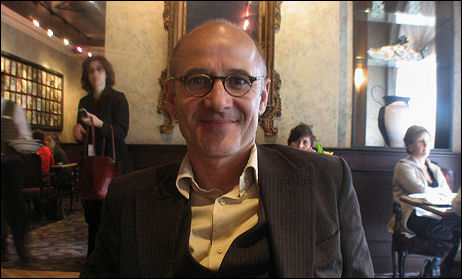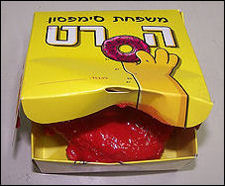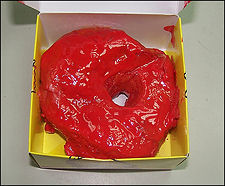Clean My Ride is a pro-ethanol, anti-big oil website pushing fuel efficiency and ethanol use as a means to reduce global warming. The webmaster is a guy named Phin — a spirited, 32 year-old, Michael Moore-sized activist from Springfield, Vermont. No last name, man beard, and chummy with GenX celebs like Matt Damon, Ben Affleck, Jennifer Garner and Sarah Silverman. These four have appeared in four Phin videos. Excellent message, meh quality. The best moment is in #4 when Damon slugs Phin.
Dargis on “Devil”
Brutal, urgent, devastating — the documentary The Devil Came on Horseback demands to be seen as soon as possible and by as many viewers as possible,” N.Y. Times critic Manohla Dargis has written. “An up-close, acutely painful call to action, the movie pivots on a young American, a former Marine captain named Brian Steidle, who for six months beginning in the fall of 2004 worked for the African Union as an unarmed monitor in Darfur.
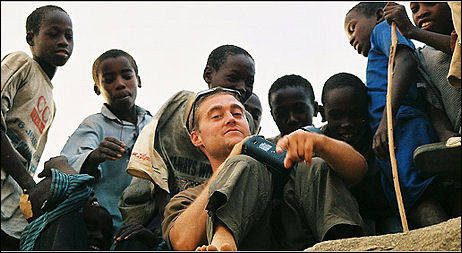
“What he saw in Darfur was unspeakable. And then he returned home, his arms, heart and head filled with the images of the dead.”
The most stirring portion is in the final two paragraphs:
“There’s really nothing more to say– and there’s everything else to say — but because I cannot improve on [N.Y. Times columnist Nicholas] Kristof‘s passionate words on Darfur, who wrote about Steidle in a March 2, 2005, column titled ‘The American Witness.’ I will repeat the final lines of his 2005 column about Mr. Steidle, which are worth repeating again and again until peace at last makes them irrelevant.
“But if our leaders are acquiescing in genocide, that’s because we citizens are passive, too. If American voters cared about Darfur’s genocide as much as about, say, the Michael Jackson trial, then our political system would respond,” he wrote. “As Martin Luther King Jr. put it: `Man’s inhumanity to man is not only perpetrated by the vitriolic actions of those who are bad. It is also perpetrated by the vitiating inaction of those who are good.’ ”
Ulrich Muhe is gone
Shattering news — Ulrich Muhe, 54, who delivered one of the most touching and devastating performances of ’06 as the Stasi agent in Florian Henckel von Donnersmarck‘s The Lives of Others, has died of stomach cancer. I’m told he had an operation immediately after the Oscar ceremony five months ago, but he lost the fight last Sunday.
I fell deeply in love with Muhe’s Lives of Others performance, yes, after seeing it at the Toronto Film Festival last September. But I felt a huge kinship with Muhe himself, partly due to interviewing him and chatting with him at a couple of TIFF parties, but also because I knew that his own disturbing history with the Stasi (they watched him very closely in the ’80s) was tied up in the role. I obviously didn’t know Muhe very well, but I feel right now as if an old friend is gone.
Sony Pictures Classics co-chairman Michael Barker called it “very, very sad news …he was a great actor, the Anthony Hopkins of Germany.” Barker said he’d first heard that Muhe “was in trouble” about two or three weeks ago.
Oregonian film critic Shawn Levy wrote this morning that Muhe’s performance “is the absolute core of this amazing film, and the images of him as an efficient tool of the state, then a man whose conscience slowly awakens, then a secret conspirator, and, finally, a man justified in his deeds if never acknowledged, are unforgettable. The film is a masterpiece and it’s impossible to imagine without him. It’s truly deflating to discover such a singular talent and then lose him in the same year.”
Muhe won Best Actor awards for his Others performance at the European Film Awards, the Copenhagen International Film Festival, the German Film Awards and the German Film Critics Association, among others.
The Lives of Others DVD will be out on 8.21.07. If you haven’t seen it, do.
Bourne vs. Bond
James Bond is “an imperialist and he’s a misogynist,” Bourne Ultimatum star Matt Damon has told an unnamed AP writer. (Let me guess….Dave Germain?) “He kills people and laughs and sips martinis and wisecracks about it.” Jason Bourne, on the other hand, “is this paranoid guy. He’s on the run. He’s not the government — the government is after him. He’s a serial monogamist who’s in love with his dead girlfriend and can’t stop thinking about her. He’s the opposite of James Bond.”
Lohan is uninsurable?
“I hope they put her in jail for as long as they can. Maybe she’ll realize how serious it is. I believe she’s uninsurable. And when you’re uninsurable in this town, you’re done.” — manager-producer Bernie Brillstein, whose company once represented John Belushi and Chris Farley, referring to Lindsay Lohan in a 7.25 piece by N.Y. Times reporter David Halbfinger.
Saying no to something or someone
“I hate these movies. I won’t see these movies. Never saw Saw or its sequels, never will. I’m not impressed with the ‘quality’ of the gore or the ‘wit’ of the filmmaking. I’m not enjoyably scared; I’m horrified, and not in the way horror fans get off, groaning and screaming with pack-mentality excitement. Instead, my horror is one of disturbance and anger: Who makes this vile crap?” — Entertainment Weekly critic Lisa Schwarzbuam in a column not yet on the magazine’s website, but quoted by Moving Picture Blog’s Joe Leydon.
See? Schwarzbaum has provided the thin end of the wedge. If Schwarzbaum can say “no, I won’t see these films” and get respect for this (she has mine), how can anyone point to another journalist who says “no, I will not sit through another Peter Jackson/Michael Bay/Roger Kumble/Catherine Zeta Jones/Brett Ratner/fill-in-the- blank film” and call his/ner prohibitive feelings neurotic or unprofessional or over the line? Everyone has their own lines in the sand. These are extreme and scary times. If you can’t say “absolutely no” to something or someone, what good are you?
Simpsons’ red donut
Israeli journalist Yair Raveh of www.cinemascope.co.il reports that Israeli marketers for The Simpsons Movie “recently sent out Simpsons treats to newsrooms and writers, but the content was less than appetizing. Journos brave enough to put the red blob in their mouths said it tasted horribly. The general hope is that the movie will be better.’ Donuts, it should be added, are not easily found in Israel but it’s still unclear how they managed to mess this up so badly.”
The Simpson’s Movie, Raveh adds, “is being released day-and-date in Israel and the States, but was not screened here to critics at all. Fox here bans all critics, not only the online ones, but everyone is too chickenshit to rally up and counter-ban.”
“Monstrous” doesn’t get it
J.J. Abrams wants to call his monster-on-the- loose-in-Manhattan movie (i.e., the one he’s producing but not directing) Monstrous? Absolutely doesn’t make it. Back to drawing board. Terrible title. End of meeting.
Eight Middle Eastern films
My latest tally of Hollywood-funded Iraq-Afghanistan movies — narratives, not docs — comes to eight. Well, nine if you count Peter Berg‘s The Kingdom, which is set in Riyahd. (There may be others I’m missing.) All but one look like chocolate sundaes to me — dramas about things harsh and seething and generating impact waves as we speak.

allegedly from Brian De Palma’s Redacted (Magnolia/HD Net, early ’08)
Great rivers of hurt are flowing through these two countries right now (God help the people caught up in it), and this, obviously, is where the dramatic raw material of our time is coming from. But who’s interested and who’s allergic? Some of these films may have “possible hit” or “potential award quality” stamped on their foreheads, but I’m wondering what the general attitude is among paying moviegoers.
Not long ago I spoke to a big-time journo who thinks without question that very few people want to plunk down $10 bucks to “go” to Iraq or Afghanistan, so to speak, and that the commercial prospects for these films don’t appear to be all that great as a result. I’m not so sure. Most people take movies as they come. I’m hoping in any case to get a sense of this from HE readers. Not so much what they them- selves feel about Middle East conflict dramas but what their friends, co-workers and family members may be saying, if anything.
Four of these films are about the Iraq War — Paul Haggis‘s In The Valley of Elah (although very little of this moralistic murder-mystery is actually set in Iraq), Brian de Palma‘s Redacted (a you-are-there combat film, due in early ’08), Kathryn Bigelow‘s The Hurt Locker (ditto, just starting to shoot) and Paul Greengrass‘s forthcoming Imperial Life in the Emerald City (shooting later this year), based on the book of the same name by Rajiv Chandrasekaran.
And four are about Afghanistan past or present — Marc Forster‘s The Kite Runner (DreamWorks, 11.2), Robert Redford‘s Lions for Lambs (United Artists, 11.9), Mike Nichols‘ Charlie Wilson’s War (Universal, 12.25) and Oliver Stone‘s Jawbreaker, which is being developed with an idea to possibly shoot next year.

Oliver Stone
I guess I’m just trying to reconcile my own keen interest in seeing these films — even The Kite Runner looks half-promising, given the source material — and this idea that “people out there” not only don’t share my enthusiasm, and may even be looking to flat-out avoid them. Is this the case? If so, why? If not, why?
I think all the neg-head talk was triggered by the failure of A Mighty Heart, but that film went down because nobody wanted to see a film about an American journalist getting his head cut off by terrorists,.
McCarthy “Ultimatum”
“If they could bottle what gives The Bourne Ultimatum its rush, it would probably be illegal,” writes Variety reviewer Todd McCarthy. “The third and purportedly final installment in the mountingly exciting series is a pounding, pulsating thriller that provides an almost constant adrenaline surge for nearly two hours.
“In setting Jason Bourne on the home stretch of his search to discover who and what made him the killing machine he is, director Paul Greengrass has outdone himself, creating a film of such sustained energy and tension that the infrequent pauses for breath seem startling in their quietude. In other hands, unrelenting nervous camera movement and machine-gun cutting prove wearying more often than not, but Greengrass skillfully employs both not only in the service of excitement, but for the accentuation of telling detail and discreet parceling out of information.
“Result is a breathless doozy that sends Bourne from Moscow to Turin, Paris, London, Madrid and Tangier, Morocco, before alighting in New York, from where the CIA’s extra-legal assassination org has been tracking his movements with the most sophisticated and instantaneous of high-tech equipment. But Bourne continually beats the agency at its own game, outwitting and tricking its surveillance ploys and besting the toughest killers the company can throw at him.”
Steidle interview
Earlier this afternoon I interviewed former Marine Cpt. Brian Steidle, author of “The Devil Came on Horseback: Bearing Witness to the Genocide in Darfur” (Public Affairs) and the “star”, so to speak, of the just-emerging doc of the same name, which I wrote about yesterday.
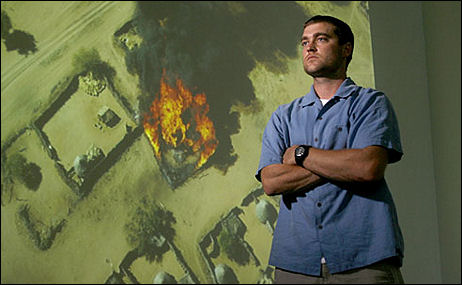
The Devil Came on Horseback has been well directed by Annie Sundberg and Rikki Stern. I was a little suprised to learn that Sundberg and Stern never visited the Darfur region, much less shot any footage there, apparently because it’s too difficult to get into the region and very dangerous besides. George Clooney couldn’t actually get it either. Steidle and I covered all of the basics. If you’re at al unclear about what’s going on over there, have a listen.
Goldstein column killed
For the sin of thinking like a free-associating innovator rather than a limits-observing company guy, Patrick Goldstein‘s latest “Big Picture” column — the one that should have been published today — was killed, allegedly by associate editor John Montorio. As L.A. Observed Kevin Roderick reports, “Goldstein’s offense was to propose that the Times follow the lead of the U.K.’s Mail on Sunday (which distributed 2.9 million free Prince CDs) and partner with older artists to give away music in the paper.

Goldstein’s column has been reprinted in full by Roderick.
Goldstein “argued it could help make the Times website a destination for fans and reduce the need for front page ads (which the editor of the Times himself calls a huge mistake),” reports Roderick. Jeez, Goldstein was just throwing out an idea. Something to kick around, run it up the flagpole, etc. What’s so bad about that? This incident illustrates how panicked the L.A. Times editors and management are today. The ship that they’ve known and nourished for years is slowly sinking and they know it, and everyone else knows it.


